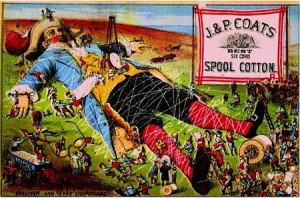(An edited version of an essay that appeared in April)Â
Doug Millison mashes up a 1979 B&W graphic by Josh Gosfield
In this final essay in a series let me explain why I accuse mass media of dereliction of duty for helping mislead the nation into war, for uncritically swallowing the sensational and for too often ignoring complex problems until they erupt into crisis.
 Idealistically I am just a very sad American who feels that our nation has strayed from Lincoln’s mission to be “the last best hope of Earth†and that much of responsibility for this lies with the failure of the working press, of which I am part — although I am now on vacation and speak only for myself.
 But I am a pragmatist who does not put much stock in hand-wringing. And while Mario Savio’s impassioned remarks (see graphic above or watch video ) resonate with me, I would not take his suggestion literally because only two types of persons throw anything, especially themselves, into machinery — saboteurs and candidates for the meat grinder. I am neither.
Nor have I merely been critical, for more authoritative critiques abound, including “Breaking the News,†“Rich Media, Poor Democracy,†“The Vanishing Newspaper,†“Fighting for Air,†and “The New Media Monopoly“.
So I have suggested how to improve the credibility of mass media by giving rank-and-file media workers blogs, hosted on company websites, so as to drill thousands of connections down into communities, and from these to pull up ideas and stories that would make better journalism and better business than the all-too-common practice of rewriting the empty press releases issued by the officialdom.
It’s good business because it is people who subscribe to newspapers, tune in to broadcasts or click on web sites. And they like to see and hear themselves. Two Stanford business school professors wrote a great article in which they asked Hoover Adams, founding publisher of the Dunn, North Carolina, Daily Record how his paper had achieved a market penetration above 100 percent. This is what the publisher told the eggheads:
It’s because of three things: Names, names, and names . . . . A local newspaper can never get enough local names. I’d happily hire two more typesetters and add two more pages in every edition if we had the names to fill them up.â€
Liberating these suppressed voices is a business opportunity because interactive media is not like mass media. Interactive media is about making connections. People to people. People to information. People to products. Whatever. The old media business model based on distribution is dead. Stick a fork in it. Web-heads like David Weinberger have been trying to tell us for a very long time the Internet is a two-way street. But we still have this mindset of the one-way trip to the driveway. And cannot get to these new land of connections with Soviet-style central planning. We must allow newsrooms to follow their audiences into the 21st Century.
In many years of covering Silicon Valley I’ve noticed how those guys promulgate “laws†to lend authority to their educated guesses. I’d call this a cheap trick but make lots of money doing this so let me tell you about Metcalfe’s law which says the more people who use a network the more valuable it becomes. More connections means greater value plus better journalism. It’s a win-win.
(Question: Is community the new media business model?)

